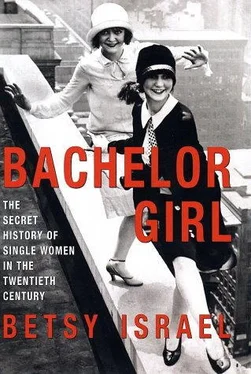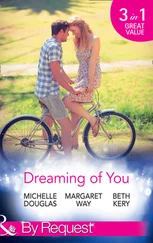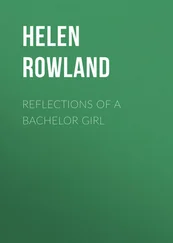This first public etiquette for American spinsters called for a muted surrender, as if a spiritual hysterectomy had been performed, leaving behind as scars an insecurity and chronic melancholia. [3] There were a few categories of spinster exemption. For example, if a woman had lived a privileged life on the stage or been a famous painter’s model or dancer, she would be presumed to possess a stage trunk full of romantic stories forever putting her out of the banal spinster category. The other “out” was the widow-manqué, the spinster who had been engaged to a brave soldier, dead in battle, his picture forever on her bureau. An excellent widow-manqué can be found in Jane, one of the two spinstered Sawyer sisters in Rebecca of Sunnybrook Farm , who lost her great love to the Civil War. Although Jane had “never left Riverboro in all the years that lay between and [had] grown into… [a] spare New England spinster… underneath was still the faint echo of that wild heartbeat of girlhood.” Her sister, in comparison, was hard, unyielding, and nasty. And occasionally a spinster character might redeem herself by marrying late, miraculously shedding her dusty paper chains. A great twentieth-century example is Miss Parthenia Ann Hawks of the musical Show Boat (1926), who’d lived “a barren spinster’s life” before her marriage to Cap’n Andy.
Typically spinsters helped with the chores at home and moved between the homes of married siblings who needed help. And as in England, they hired themselves out as paid companions, tutors, schoolteachers or assistants, and seamstresses. Within the household, even if this was her original family household, she was made to seem unimportant and childlike—for a woman’s adult life began at marriage—and she was expected to keep herself well occupied and out of the way. One force-fed book, The Afternoon of Unmarried Life (1858), suggested that the maiden female not engage in any taxing physical activity, including walks, unless they were limited to the periphery of one’s property. The poor thing might wander off and happen upon a preacher, some itinerant revivalist who might excite her, and as this and other manuals explained, these women, naïfs, were prone to outbursts of ecstatic piety. “She must never risk to be made enthusiastic by religious fervour… or agitated,” warned the author, hinting obliquely at sexual arousal. But an “industrious, independent, cheerful” spinster (the words of a bishop) need not be treated like a neutered pet (my own). She made an excellent companion for aging parents; in short, she was like a walking retirement benefit.
Of course “spinsters,” having perfected this meager act, still hoped for future union—whether with like friends or, still, yes, perhaps a man. Consider this excerpt from an 1867 “storiette” (a very short story, usually romantic, published in early magazines and compilations). In this one, a thirty-eight-year-old woman awaits the arrival of a man she was once engaged to, a man who went off to find fortune and has now returned. Here she is before her looking glass:
“A lavendar gown,” said Miss Cambron, with a stiff and critical survey of herself in the glass… quite suited to thirty eight; some lines about the mouth and eyes; a mere ghost of color… a look not specifically young. He won’t come again! He’ll want some little blue eyes—with pink cheeks and a coral necklace! It’s not his fault [still] she stood at her mirror contrasting the image it gave her with another from the deepening glass of her memory—that of a young girl.
She goes on at some length about her lack of “bloom,” the rosy-colored cheeks that define a woman as happy and young. (The concept of “bloom” figures heavily into many nineteenth-century spinster novels; in Jane Austen’s Persuasion it is mentioned twenty-one times.) Once it goes, the skin is pallid, symbolizing inevitable and rapid decay.
But it is important now to pause and state that not all women shared this belief in slow evisceration or found it at all relevant to their futures.
TRUE WOMEN AND THE SINGLY BLESSED
They are not a widely known group of women. They led no particular movement, formed no political cells, did not even qualify as a peer cohort—still, they made some small history by saying no. No to marriage proposals, in which the concept of “forever,” as Florence Nightingale famously said, slid into “never.” As in never being wholly oneself; never being permitted to make up one’s own mind; never to be able to move about freely. In some sense, buried alive. Especially if one was marrying just to marry. As one Eliza Southgate wrote to a friend in 1841, “Which is more despicable? She who married a man she scarcely thinks well of—to avoid the reputation of ‘old maid’—or she who…preferred to live her single life?”
She who “preferred to live her single life” lived it most often in New England, from the 1830s through the mid-1870s. This was the era of “single blessedness,” an almost devotional phrase used by a fairly elite and intellectual band of single women to describe a state of unmarried bliss. To sketch a quick composite of this early rebel, we can say that she grew up amid intellectuals, preachers or writers, with left-leaning principles and a love of oration. Household conversation ranged from abolitionism, transcendentalism, or trade unionism to any other radical topic then debated at public meetings and in Unitarian church sermons. She may not have received an education like her brother’s, but on her own she had trained her mind the way others had worked to play delightfully upon the pianoforte, or to sing lieder (not that she lacked these more delicate talents). Living across an expanse of cities, towns, and states, these single women did not create a declaration of their beliefs. But if they had, it might have been this: a desire to elevate singlehood from its status as horrifying fate to “an expression of self-reverence.”
Dr. Lee Virginia Chambers-Schiller, author of Liberty: A Better Husband, a dazzling book on these women, derived the term “singly blessed” from a letter, written in 1820 by a frustrated young woman, Eliza Chaplin, to her friend Laura Lovell. As Chaplin wrote of marriage and singlehood: “[rather than] endure the unhappiness that exists where minds are ‘fettered to a different mold,’ and rather [than] be subject to the ‘eternal strife’ which… prevails [I prefer] ever to remain in ‘single blessedness’ and deem it felicity thus to live.”
The list of women who described themselves this way was long: the abolitionist Grimké sisters, Florence Nightingale, the poet and onetime mill girl Lucy Larcom, Louisa May Alcott, Susan B. Anthony, Drs. Elizabeth and Emily Blackwell, Vida Scudder, and M. Carey Thomas, second president of Bryn Mawr and one of the first women to attend Cornell. There were even a few men who agreed; commentator Aretemus B. Muzzy wrote during the 1840s: “A single life is not without its advantages; while a married one that fails… is the acme of earthly wretchedness.”
Single blessedness had its roots in the eccentric nineteenth-century New England household but, more important, in new attitudes toward female education. Starting at midcentury, many middle-class families began to send pubescent girls to boarding schools, and later a smaller number would send their most insistent marriage-aged daughters to “girls’ college.” (Among the elite schools, Vassar opened in 1861, Wellesley in 1870; Smith in 1871, and Bryn Mawr in 1885.) A few of the most determined enrolled in the small number of all-male schools admitting women, while the majority of the education-minded daughters attended the teaching academies known as “normal schools.”
No matter how unusual and enlightened her upbringing, no adolescent girl started out in life aspiring to a state of single blessedness. She entered boarding school understanding what any average woman knew: Marriage served as a woman’s only practical life solution. Moreover, it served as her moral and spiritual duty. If any aspect of this observation had been left unclear, every political, religious, educational, and literary force in the culture, every leader, of anything, wrote out or recited for girls the female life agenda: to make and maintain the family home, populating it with no fewer than five children (allowing for inevitable miscarriages), and to create within it a calm, well-decorated realm for her hardworking, exhausted husband.
Читать дальше












